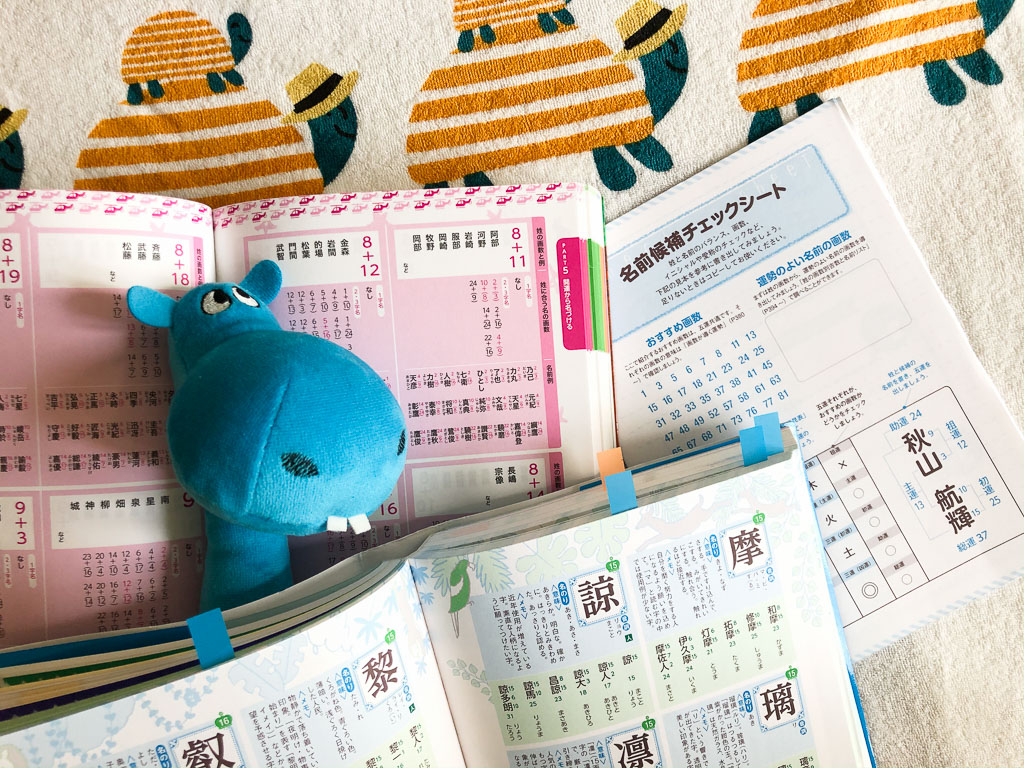Names. Names has always fascinated me. I remember when my little sister was born and I had a favourite name that I was trying to convince my parent’s to give her. I really loved that name, and eventually it became my sisters third name – that is how it is in Sweden, you can have more than one given name. In Japan there is one name per person. But on the other hand there is kanji here, Chinese characters that, if we choose to use them instead of the Japanese alphabets, take name giving to a whole new level. Another difference is that in Sweden we have three months to decide on and register the baby’s name; in Japan only two weeks, and with the Corona virus still being a big problem, we do not want to unnecessarily go to the Ward Office, which means that we have to factor in submitting our name application by registered mail.
Kanji and a tight deadline meant that my wife and I have spent a lot of time recently trying to find a beautiful name for our baby before giving birth. We started out by buying a coplue of naming books. There are so many available in Japan, thick books with thousands and thousands of names. The beauty with kanji is that one pronunciation can be written in many different ways, different kanjis can be used, and each kanji has its own meaning. Finding a name becomes a sort of balancing act between sound and meaning. And stroke count – how many strokes each kanji has, and how these numbers relate to each other and to the family name.

Studying the theory of counting strokes of Chinese characters made me aware of a whole new world of fortune telling. Different methods and different schools of thought exists, some even including the names and birthdays of the parents, as well as the time of birth if the baby, and they all seem to aim to help parents find the best possible name for a newborn child to have a good life. Apart from the books, there is also an abundance of online apps that claim to calculate the good and the evil of a particular name in combination with the family name, and while this can be fun (and sometimes useful to find out about the meaning of a certain name), my wife and I decided to try to focus on finding beautiful Chinese characters to go with the chosen pronunciation of our sons name – we both have the same shining image of our baby boy so we wanted to find kanji that shared this sense of beauty.
As if this was not complicated enough, we wanted to find a name that works well in both Sweden and Japan. Had our baby been a girl, there would have been a lot of names that are easy to use in both Japan and Sweden; Anna, Hanna, Sara, Erika, Mari, to name a few. When it comes to boy’s names on the other hand… We decided against Kenta, and then we draw a blank. So with no preconceptions we started to explore sounds that we like (or maybe I should say I explored and my wife had to painfully listen to me repeating a lot of silly suggestions for names whose pronunciation I find beautiful when my wife says them). Then finally, inspired by a movie night, we both independently had the same thought – how about this name for our baby. And consulting our naming books, we stumbled across two Chinese characters that beautifully describes the image we have of our little son. And as cream on the mash (the literal translation from Swedish of the expression meaning icing on the cake) the name has a beautiful meaning in Swedish as well. For now we keep the name to ourselves.
About the stroke count? While not putting importance on it, we could not avoid playing with the numbers and it seems like our choice would be a good enough fit with our family name as well.
Share this post
